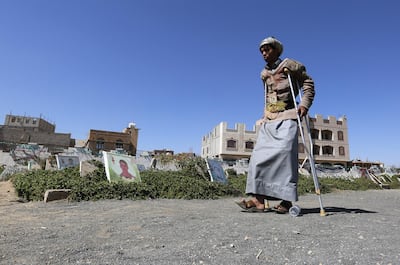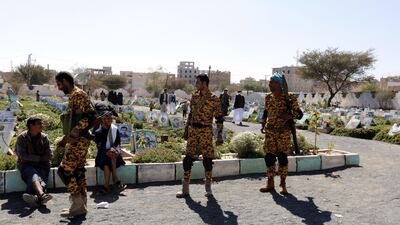A UN mission monitoring a ceasefire in Yemen's port city of Hodeidah arrived in Aden on Saturday, where they met with Yemeni government officials before a scheduled trip to the rebel-held capital of Sanaa, Waleed Al Qudaimi, the deputy governor of Hodeidah, told The National.
The team led by Patrick Cammaert, a retired Dutch general, will travel to Hodeidah after their stop in Sanaa, where they will meet Houthi officials, Colonel Wathah Al Dubaish, a spokesman for the pro-government Al Amalikah forces said.
The UN mission is meant to secure the functioning of Hodeidah's port as well as supervise the withdrawal of fighters from the city.
Pro-government forces are expected to withdraw to the southern flanks of Hodeidah while Houthi rebels withdraw to areas in the north after the arrival of UN monitors, a source in the Yemeni army told The National.
Another source with the Al Amalikah Brigades told The National that pro-government forces stationed on the front lines in Hodeidah have received orders from central command on Friday to withdraw to the southern outskirts of the city.
"We have withdrawn our forces from positions in the city to the southern area of Al Duraihmi," he said. "At the moment, forces affiliated with the National Resistance led by Major Tariq Saleh are still deployed in their positions in the city and they are supposed to withdraw to the southern areas too in the next few days."
Residents in Hodeidah said on Saturday that the area had been calm since Friday evening.
A resident said Houthi rebels were still stationed across Hodeidah and could be seen wearing the uniforms of official security forces.
Mr Cammaert on Saturday was welcomed on arrival by Gen Saghir bin Aziz, who heads the government team tasked with organising the withdrawal of troops from Hodeidah.
He also met with Yemeni Prime Minister Maeen Abdulmalik and the governor of Hodeidah Hassan Taher, Mr Al Dubaish said.

The UN team was on Friday given an initial period of 30 days to monitor a ceasefire between government forces and Houthi rebels in Hodeidah and surrounding areas, with any breaches to be reported by Secretary General Antonio Guterres to the Security Council.
The mandate came in a resolution unanimously adopted by the 15-member council, one week after Martin Griffiths, the UN special envoy to Yemen, said there was an urgent need that the truce be verified on the ground.
The resolution authorises the secretary general to establish and send an advance team to begin monitoring the ceasefire and to put into effect the Stockholm Agreement that came out of UN-brokered peace talks between Yemen's internationally recognised government and the Houthis in Sweden last week. Mr Guterres will report to the Council on a weekly basis regarding the ceasefire and the situation in Yemen.
The resolution was greeted with support from the UAE and Saudi Arabia, the main powers in the Arab-led coalition that backs Yemen's government.
The UAE's Minister of State for Foreign Affairs Dr Anwar Gargash said on Twitter that the resolution "sends a strong message & forms an important step towards a lasting political solution".
He said the Security Council's decision "will help ensure the ceasefire & redeployment are upheld".
Khalid Manzalawi, Saudi Arabia's deputy permanent representative to the UN, said the resolution "confirms Saudi diplomatic efforts and their direct impact on the international community's decision", according to the Saudi Press Agency.
_______________
Read more:
UN team given 30 days to monitor Yemen ceasefire
Yemen: Hodeidah ceasefire is working, says UN envoy Martin Griffiths
Observers fear Hodeidah deal may not lead to end of Yemen's war
_______________
The resolution also "confirms the success of military pressure exerted by the [Arab] Coalition and Saudi-led diplomatic efforts in compelling Houthi rebels to withdraw from Hodeidah," the SPA said.
In a statement released late Friday, the Yemeni government pledged to work "in a positive spirit" with Mr Griffiths towards a lasting political agreement to end the war.
The Yemeni government also called on the international community to monitor violations being committed by Houthi rebels in what it said was an attempt to undermine the ceasefire.
The government also said it saw no purpose in sitting for a second round of negotiations with Houthi rebels until they withdraw from Hodeidah and its harbours and security forces recognised by the Yemeni government are redeployed.
Speaking at the UN Security Council after the vote, Sweden's UN Ambassador Olof Skoog said the “UN has a key role in working with the parties to ensure that the ceasefire is upheld and the ports and roads can remain open for provisions to enter the country".
"Sweden stands ready to participate in the UN presence that will be established in Hodeidah," he said.
Mr Skoog said the Security Council resolution did not address all issues in Yemen's "multifaceted crises" but implementation of the Stockholm agreement "will provide much needed steps in that direction".
He said it would also have a "direct and positive humanitarian impact for the people of Yemen", who face the world's worst humanitarian crisis and are on the brink of starvation.
Rights groups have also praised the resolution.
The International Rescue Committee said the Security Council had at last taken "a much-needed step" to respond to Yemen's humanitarian disaster and growing international desire to end the three-year war.
Frank McManus, the IRC's Yemen country director, said that "with more than 20 million Yemenis facing severe hunger, and 10 million on the brink of famine, it is imperative the agreements reached in Sweden are implemented effective immediately".
He said improved access for humanitarian aid and workers, the opening of all ports and airports and the payment of vital public sector workers "will save lives and can avert a full-fledged famine".

